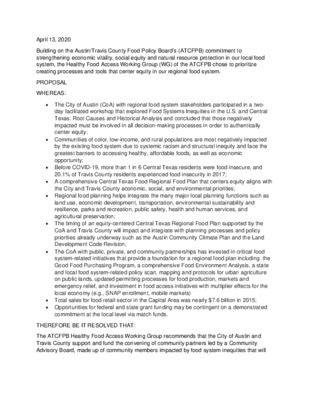Backup_ATCFPB_Revised ATCFPB Food Access Recommendation — original pdf
Backup

Building on the Austin/Travis County Food Policy Board’s (ATCFPB) commitment to strengthening economic vitality, social equity and natural resource protection in our local food system, the Healthy Food Access Working Group (WG) of the ATCFPB chose to prioritize creating processes and tools that center equity in our regional food system. April 13, 2020 PROPOSAL WHEREAS: • The City of Austin (CoA) with regional food system stakeholders participated in a two- day facilitated workshop that explored Food Systems Inequities in the U.S. and Central Texas: Root Causes and Historical Analysis and concluded that those negatively impacted must be involved in all decision-making processes in order to authentically center equity; • Communities of color, low-income, and rural populations are most negatively impacted by the existing food system due to systemic racism and structural inequity and face the greatest barriers to accessing healthy, affordable foods, as well as economic opportunity; • Before COVID-19, more than 1 in 6 Central Texas residents were food insecure, and 20.1% of Travis County residents experienced food insecurity in 2017; • A comprehensive Central Texas Food Regional Food Plan that centers equity aligns with the City and Travis County economic, social, and environmental priorities; • Regional food planning helps integrate the many major local planning functions such as land use, economic development, transportation, environmental sustainability and resilience, parks and recreation, public safety, health and human services, and agricultural preservation; • The timing of an equity-centered Central Texas Regional Food Plan supported by the CoA and Travis County will impact and integrate with planning processes and policy priorities already underway such as the Austin Community Climate Plan and the Land Development Code Revision; • The CoA with public, private, and community partnerships has invested in critical food system-related initiatives that provide a foundation for a regional food plan including: the Good Food Purchasing Program, a comprehensive Food Environment Analysis, a state and local food system-related policy scan, mapping and protocols for urban agriculture on public lands, updated permitting processes for food production, markets and emergency relief, and investment in food access initiatives with multiplier effects for the local economy (e.g., SNAP enrollment, mobile markets) • Total sales for food retail sector in the Capital Area was nearly $7.6 billion in 2015; • Opportunities for federal and state grant funding may be contingent on a demonstrated commitment at the local level via match funds. THEREFORE BE IT RESOLVED THAT: The ATCFPB Healthy Food Access Working Group recommends that the City of Austin and Travis County support and fund the convening of community partners led by a Community Advisory Board, made up of community members impacted by food system inequities that will result in measurable equitable food-related outcomes through a Central Texas regional food plan that includes sustainable operational structures, policies, programs and financing. These investments will result in a community-supported regional food system plan with specific proposed recommendations policies and processes by public, private, and institutional entities that address the legacy of historical injustices related to food production, processing, distribution, access, and waste. MOREOVER BE IT RESOLVED: That in order to achieve concrete equitable structures and racially equitable outcomes a one- time investment of $250,000 for FY20-21 must include: • the development of the equity tool; o $10k for community engagement (stipends and supports -- food, childcare, and transportation to facilitate authentic participation and expertise of negatively impacted stakeholders, and support for an inclusive facilitated evidence-based process • deployment of the equity tool; o $25k for support of ten organizations implementing the assessment ($2,500 each) o $25k for external evaluation of the organization’s assessment o $15k for development of recommendations • administrative support for backbone organization supporting the Regional Planning Collaboration; and o $75k RFP for a contract to cover 1 year of organizational support (logistics, communication, deliverable/output) • community engagement at the regional level. o $100k RFP for community engagement/outreach Develop and implement an outreach strategy $30k to host two community input meetings in each of the 5 counties ($6k for each workshop and supports – food, childcare and transportation) $15k to hire 10 ambassadors (two per county @ $1,500 each) to gather inputs on food system strategies via various means (ie. Public events, meetings with elected officials, presentations at network meetings, etc.) Host one Food System Summit